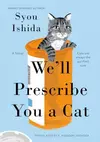
Eduardo Santiago

Bello tributo a la obsesión, inspiración, al genio y los bordes de la cordura. Encontré fascinante como Labatut juega con la realidad, pero no quiero hablar mucho sobre su estilo, aún en spoiler, pues él lo explica en los Reconocimientos finales. Un truco literario muy efectivo y original.
Bello tributo a la obsesión, inspiración, al genio y los bordes de la cordura. Encontré fascinante como Labatut juega con la realidad, pero no quiero hablar mucho sobre su estilo, aún en spoiler, pues él lo explica en los Reconocimientos finales. Un truco literario muy efectivo y original.

Mindblowing, riveting. Humbling: there is so much life and beauty all around us that we rarely get to see because we're in our lit homes or cars or carrying our light with us. I'll never get to see fireflies or glowworms or bioluminescent mushrooms, but maybe you will, and if you can, you should. And we can all make efforts to see moonflowers and moths; to listen to owls; to gaze in awe at bats in twilight. And to be much more mindful about our outside lights. Henion feels a deep sense of wonder over all this amazing life, and she conveys it to the reader.
Mindblowing, riveting. Humbling: there is so much life and beauty all around us that we rarely get to see because we're in our lit homes or cars or carrying our light with us. I'll never get to see fireflies or glowworms or bioluminescent mushrooms, but maybe you will, and if you can, you should. And we can all make efforts to see moonflowers and moths; to listen to owls; to gaze in awe at bats in twilight. And to be much more mindful about our outside lights. Henion feels a deep sense of wonder over all this amazing life, and she conveys it to the reader.

Fascinating and lovely all the way through. Part memoir, part nature guide, and, yes, part manifesto but please don't let that put you off. This is a beautiful work.
Kaishian's nature writing is exquisite. She depicts slugs, crows, mushrooms, eels lovingly: To give someone or something your attention can be a sacred act, she writes, and she does so to every creature she mentions. She blends her memoir effectively into each chapter, acknowledging her trauma (generational and personal) and her healing, her struggles with loneliness, her need for safe spaces, skillfully making each part of herself relevant and strongly tied to the chapter theme.
What I find a stretch is her desire to queerify nature: hermaphroditism in some animals, same-sex couplings in others, fungal sexual permutations, she celebrates them all as "queer" and points them out as counterexamples to cultural heteronormativity. To me, there's a different word that suits them better: "natural." Same with the whole spectrum of humanity. Does she do that as a way of finding belonging? As a way to shock readers into understanding? (Unlikely: the kind of people who think in black-white binary terms, those who need to read this book, are precisely the ones who won't). Or is my cishet privilege coming through in a way I don't recognize? I'd love to hear my queer friends' thoughts on this
Fascinating and lovely all the way through. Part memoir, part nature guide, and, yes, part manifesto but please don't let that put you off. This is a beautiful work.
Kaishian's nature writing is exquisite. She depicts slugs, crows, mushrooms, eels lovingly: To give someone or something your attention can be a sacred act, she writes, and she does so to every creature she mentions. She blends her memoir effectively into each chapter, acknowledging her trauma (generational and personal) and her healing, her struggles with loneliness, her need for safe spaces, skillfully making each part of herself relevant and strongly tied to the chapter theme.
What I find a stretch is her desire to queerify nature: hermaphroditism in some animals, same-sex couplings in others, fungal sexual permutations, she celebrates them all as "queer" and points them out as counterexamples to cultural heteronormativity. To me, there's a different word that suits them better: "natural." Same with the whole spectrum of humanity. Does she do that as a way of finding belonging? As a way to shock readers into understanding? (Unlikely: the kind of people who think in black-white binary terms, those who need to read this book, are precisely the ones who won't). Or is my cishet privilege coming through in a way I don't recognize? I'd love to hear my queer friends' thoughts on this
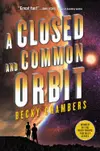
(Clarification first: this is not a sequel to The Long Way to a Small, Angry Planet. There's a connection, but it's tenuous at best. Don't expect any of the same characters or situations.)
And, with that out of the way, squee again! Not at first — I was slow to catch feelings for these characters — but catch them I did, and it all just kept getting better and better up to the very end. In this book, Chambers speaks to the Broken Ones: those of us with physical and/or psychic trauma, different, weird, hurting. And she writes about grit, compassion, caring, finding one's tribe, one's purpose, one's self. There's a whole lotta love in these books, and okay it can be a little thick at times, but right now I'm A-OK with that. [UPDATE October 2025: reread, and I stand by my earlier comments]
(Clarification first: this is not a sequel to The Long Way to a Small, Angry Planet. There's a connection, but it's tenuous at best. Don't expect any of the same characters or situations.)
And, with that out of the way, squee again! Not at first — I was slow to catch feelings for these characters — but catch them I did, and it all just kept getting better and better up to the very end. In this book, Chambers speaks to the Broken Ones: those of us with physical and/or psychic trauma, different, weird, hurting. And she writes about grit, compassion, caring, finding one's tribe, one's purpose, one's self. There's a whole lotta love in these books, and okay it can be a little thick at times, but right now I'm A-OK with that. [UPDATE October 2025: reread, and I stand by my earlier comments]
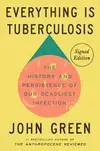
Yes, TB is still a thing. Or is it? On the one hand, over one million people die of it each year and millions more suffer. On the other, most of those millions have skin which is high in melanin. Should we care? John Green, along with health professionals all over the world and countless humans, make a convincing case that we should; attorneys representing the Johnson & Johnson corporation, and a few other members of class Republicania I mean Reptilia, argue otherwise. Who's to say who's right?
Green is perhaps the best person to tackle this difficult subject, to make it accessible, and he's done so. His narrative weaves between tragic single deaths and the incomprehensible mind-numbing statistical millions, and he does so in a way that boosts our compassion for all and our anger at the systems that enable these injustices. I admire how he upends germ theory, asserting that TB is not in fact caused by Mycobacterium tuberculosis but by malnutrition, poverty, and stress. Billions of us carry the bacillus, asymptomatic: it's when we suffer that the disease manifests, in turn begetting more suffering. Fiendish. (I don't mean the bug, I mean the human greed that keeps us from responding to this suffering). It was chilling to read this book so soon after Kinship Medicine: so many common threads, so many shared frustrations.
I don't read many white-male authors these days, but Green is a noble exception. He demonstrates compassion and humility and is using his talent for good. Not quite five stars, but am rounding up because of the human importance of this work.
Yes, TB is still a thing. Or is it? On the one hand, over one million people die of it each year and millions more suffer. On the other, most of those millions have skin which is high in melanin. Should we care? John Green, along with health professionals all over the world and countless humans, make a convincing case that we should; attorneys representing the Johnson & Johnson corporation, and a few other members of class Republicania I mean Reptilia, argue otherwise. Who's to say who's right?
Green is perhaps the best person to tackle this difficult subject, to make it accessible, and he's done so. His narrative weaves between tragic single deaths and the incomprehensible mind-numbing statistical millions, and he does so in a way that boosts our compassion for all and our anger at the systems that enable these injustices. I admire how he upends germ theory, asserting that TB is not in fact caused by Mycobacterium tuberculosis but by malnutrition, poverty, and stress. Billions of us carry the bacillus, asymptomatic: it's when we suffer that the disease manifests, in turn begetting more suffering. Fiendish. (I don't mean the bug, I mean the human greed that keeps us from responding to this suffering). It was chilling to read this book so soon after Kinship Medicine: so many common threads, so many shared frustrations.
I don't read many white-male authors these days, but Green is a noble exception. He demonstrates compassion and humility and is using his talent for good. Not quite five stars, but am rounding up because of the human importance of this work.
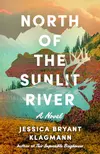
So much heart. Beautiful flawed characters, running to or running from; some strong, some less so; some demonstrating kindnesses that left me stunned. And grief—so much grief, and bereavement (they’re different), and grit. Klagmann has a gift for depicting loss. Gently, calmly, corner-of-the-eye. The grief we live with every day; that forms us.
Not everything worked for me. Klagmann’s form of magical realism is a challenge: at each introduction of a magical element my first reaction is “no, no, it doesn’t work that way” before I remember to engage my Suspension of Disbelief Engine. (This Impossible Brightness had much the same effect on me. I find my response curious and wonder if others feel similarly.) And halfway through, the parts with the journal, felt a little clunky. Beautiful language, but clearly an exposition tool.
No matter. I am overwhelmingly glad to have kept going, just like with Impossible Brightness. These are characters I wanted to talk to. To listen to. Near the end, thirty pages left to go, I felt myself tensing up: in part wondering how she was going to wind everything up, but then realizing that I was dreading that possibility. I didn’t want the book wrapped up; wanted to live in it a while longer. Still do.
[ Tangent: At the book launch two weeks ago Klagmann remarked on how surprised she felt about the novel's progression, how it went in directions she never imagined when she started writing. After hearing that, it was impossible for me not to read the novel with that in mind: every development had me wondering about paths not taken. It added a thoughtful, but not overly distracting, dimension to my reading. I recommend it. ]
So much heart. Beautiful flawed characters, running to or running from; some strong, some less so; some demonstrating kindnesses that left me stunned. And grief—so much grief, and bereavement (they’re different), and grit. Klagmann has a gift for depicting loss. Gently, calmly, corner-of-the-eye. The grief we live with every day; that forms us.
Not everything worked for me. Klagmann’s form of magical realism is a challenge: at each introduction of a magical element my first reaction is “no, no, it doesn’t work that way” before I remember to engage my Suspension of Disbelief Engine. (This Impossible Brightness had much the same effect on me. I find my response curious and wonder if others feel similarly.) And halfway through, the parts with the journal, felt a little clunky. Beautiful language, but clearly an exposition tool.
No matter. I am overwhelmingly glad to have kept going, just like with Impossible Brightness. These are characters I wanted to talk to. To listen to. Near the end, thirty pages left to go, I felt myself tensing up: in part wondering how she was going to wind everything up, but then realizing that I was dreading that possibility. I didn’t want the book wrapped up; wanted to live in it a while longer. Still do.
[ Tangent: At the book launch two weeks ago Klagmann remarked on how surprised she felt about the novel's progression, how it went in directions she never imagined when she started writing. After hearing that, it was impossible for me not to read the novel with that in mind: every development had me wondering about paths not taken. It added a thoughtful, but not overly distracting, dimension to my reading. I recommend it. ]
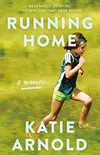
Eleven years ago I mindfully took a large (medicinal) dose of psilocybin and sat down for the ride. The lesson I received—and which has shaped my life since—was to Pay Attention. To focus on What's Important. I see this book as Arnold's journey to the same lesson and, much more importantly, as a gift to the world: for some readers, her words will resonate. Teach. Heal. Maybe through running, but not necessarily: what the book illustrates is that there are paths to wisdom and that we can find ours.
Arnold carries burdens too heavy for her, and writes about them with vulnerability and grace. The book is a fascinating study in human relationships, and Arnold exquisitely paints the dynamics of what is said or unsaid and how. She has an impressive ability to convey nuance. Many of the scenes transported me to ones in my own past - self-recriminations, fears, doubts, loss. The brain chatter we all have but never speak of, each of us fighting with in our own ways until, if we're lucky, we occasionally learn to accept and love and maybe tame.
Recommended for anyone pursuing self-awareness, whether you're a runner or not. Bonus points for vivid depictions of Northern New Mexico.
Eleven years ago I mindfully took a large (medicinal) dose of psilocybin and sat down for the ride. The lesson I received—and which has shaped my life since—was to Pay Attention. To focus on What's Important. I see this book as Arnold's journey to the same lesson and, much more importantly, as a gift to the world: for some readers, her words will resonate. Teach. Heal. Maybe through running, but not necessarily: what the book illustrates is that there are paths to wisdom and that we can find ours.
Arnold carries burdens too heavy for her, and writes about them with vulnerability and grace. The book is a fascinating study in human relationships, and Arnold exquisitely paints the dynamics of what is said or unsaid and how. She has an impressive ability to convey nuance. Many of the scenes transported me to ones in my own past - self-recriminations, fears, doubts, loss. The brain chatter we all have but never speak of, each of us fighting with in our own ways until, if we're lucky, we occasionally learn to accept and love and maybe tame.
Recommended for anyone pursuing self-awareness, whether you're a runner or not. Bonus points for vivid depictions of Northern New Mexico.
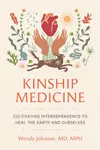
UPDATE: Second, slower reading. I found it more somber this time around, and it's entirely because of the zeitgeist. Johnson's message has not changed -- connection is how we can heal -- but September 2025 is a much grimmer world than June 2025. On the plus side, this reinforces Johnson's imperative to tackle the issue bottom up; on the down side, grassroots is hard; but then, back to the plus side, challenges bring out the best in us. Let's take this on. Read this, and push to build community. Take a hike. Plant a tree. Sit in comfortable silence with a loved one. And pass it on.
We are sick; we are tired; and we are sick and tired of the increasingly downward spiral we're in. Johnson addresses our unwellness from many perspectives, using a systems-level view to converge on an integrated picture of what ails us, how we got here, and where we need to focus if we want to fix things. She draws from her experiences as a medical practitioner and an acequia community member. She cites up-to-date research, and she's done her homework: the text is well dotted with end notes in all the appropriate places, and those references are current and relevant.
Johnson's argument boils down to the undeniable fact that humans evolved as cooperators, not just with each other but with our environment: awareness of surroundings, and recognition of reciprocal needs and responsibilities, is what kept our ancestors alive and even thriving. The hijacking of social norms by self-absorbed greedy individualists has cost us dearly. This will not come as a surprise to most readers, since we tend to self-select... but it might be news to some of our less aware friends-and-relations, so this is a book to read and then pass along strategically.
What was a surprise to me was Johnson's inspiring final chapters. She asserts that we already have the principal tool we need to address our situation: imagination. Since imagination does not spring ex nihilo, she provides a helping hand: examples of successful (albeit small-scale) cultural shifts that have led to progress. Maybe you, or someone you gift this book to, will envision a step-by-step path to a healthier planet and a healthier us.
I felt uncomfortable in two dimensions. First, the privilege: access to trees and birds and land and silence will never be possible in a planet of N-billion humans. Second, the privilege: the precautionary principle espoused in chapter 11 has a strong anti-development hint to it. Both of these issues are much too complex to go into here; and, to be fair, Johnson acknowledges them to some extent. I can live with my discomfort, because the book's assets—its arguments, evidence, insights, and above all its intriguing final chapters of promise—far outweigh the negatives.
Thank you North Atlantic Books for providing this book for review consideration via NetGalley. All opinions are my own.
UPDATE: Second, slower reading. I found it more somber this time around, and it's entirely because of the zeitgeist. Johnson's message has not changed -- connection is how we can heal -- but September 2025 is a much grimmer world than June 2025. On the plus side, this reinforces Johnson's imperative to tackle the issue bottom up; on the down side, grassroots is hard; but then, back to the plus side, challenges bring out the best in us. Let's take this on. Read this, and push to build community. Take a hike. Plant a tree. Sit in comfortable silence with a loved one. And pass it on.
We are sick; we are tired; and we are sick and tired of the increasingly downward spiral we're in. Johnson addresses our unwellness from many perspectives, using a systems-level view to converge on an integrated picture of what ails us, how we got here, and where we need to focus if we want to fix things. She draws from her experiences as a medical practitioner and an acequia community member. She cites up-to-date research, and she's done her homework: the text is well dotted with end notes in all the appropriate places, and those references are current and relevant.
Johnson's argument boils down to the undeniable fact that humans evolved as cooperators, not just with each other but with our environment: awareness of surroundings, and recognition of reciprocal needs and responsibilities, is what kept our ancestors alive and even thriving. The hijacking of social norms by self-absorbed greedy individualists has cost us dearly. This will not come as a surprise to most readers, since we tend to self-select... but it might be news to some of our less aware friends-and-relations, so this is a book to read and then pass along strategically.
What was a surprise to me was Johnson's inspiring final chapters. She asserts that we already have the principal tool we need to address our situation: imagination. Since imagination does not spring ex nihilo, she provides a helping hand: examples of successful (albeit small-scale) cultural shifts that have led to progress. Maybe you, or someone you gift this book to, will envision a step-by-step path to a healthier planet and a healthier us.
I felt uncomfortable in two dimensions. First, the privilege: access to trees and birds and land and silence will never be possible in a planet of N-billion humans. Second, the privilege: the precautionary principle espoused in chapter 11 has a strong anti-development hint to it. Both of these issues are much too complex to go into here; and, to be fair, Johnson acknowledges them to some extent. I can live with my discomfort, because the book's assets—its arguments, evidence, insights, and above all its intriguing final chapters of promise—far outweigh the negatives.
Thank you North Atlantic Books for providing this book for review consideration via NetGalley. All opinions are my own.
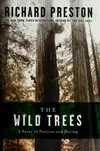
Fascinating. Preston compellingly weaves botany, history, adventure, while never losing focus on the humanity of the participants. (Maybe a little too much focus sometimes).
Fascinating. Preston compellingly weaves botany, history, adventure, while never losing focus on the humanity of the participants. (Maybe a little too much focus sometimes).
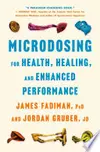
Encyclopedic but highly readable. Microdosing is not new to me, but much of the information here is: different protocols, dose guidelines, and a well-organized catalog of health conditions for which there are promising field reports. (Yes, it's anecdata. Gathered over years from tens of thousands of participants. Standard research is obviously impossible for these medicines.) Conditions like ADHD, depression, Long Covid, migraine, chronic pain. Even with a huge grain of salt, these are remarkable findings. Highly recommended. At a bare minimum, read the ToC and see if any of the conditions apply to your life or that of a loved one.
Encyclopedic but highly readable. Microdosing is not new to me, but much of the information here is: different protocols, dose guidelines, and a well-organized catalog of health conditions for which there are promising field reports. (Yes, it's anecdata. Gathered over years from tens of thousands of participants. Standard research is obviously impossible for these medicines.) Conditions like ADHD, depression, Long Covid, migraine, chronic pain. Even with a huge grain of salt, these are remarkable findings. Highly recommended. At a bare minimum, read the ToC and see if any of the conditions apply to your life or that of a loved one.
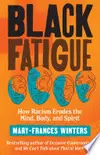
The energy it must have taken to write this in such a calm, collected voice. The anguish that Winters must be feeling in 2025. I can only barely imagine but I'm trying to do so, to use that energy to fuel me. We have so much work to do.
The energy it must have taken to write this in such a calm, collected voice. The anguish that Winters must be feeling in 2025. I can only barely imagine but I'm trying to do so, to use that energy to fuel me. We have so much work to do.
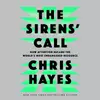
Added to listBarack Obama's 2025 Summer Readswith 10 books.
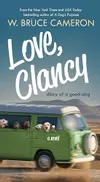
Many sweet moments, and many funny ones, but overall I found it annoying. The whole way through I kept wanting to DNF, but persevered because two people I love and trust urged me to... and, okay, they were right, it was worth finishing, but what an ordeal. I get that it's a farce, that the irritating characters are played for yuks, but they were too much: too obnoxious, too grating, and JayB (main human character) too much of a doormat. The character with by far the highest EQ and IQ was Clancy, the canine narrator.
Which brings me to my biggest disconnect. One problem with having read Nagel ("What Is It Like to Be a Bat?") is that books like these — written from the PoV of a dog — become exercises in nitpicking. A sentence such as "Alana turned her face away, hiding a smile": the emotional, social, situational, and cultural awareness it takes to observe and write that is beyond the ability of many humans; and we're supposed to believe this is a dog? I'm sorry, I can't buy that. I hate to make accusations without proof, but I'm like 90% sure that Mr. Cameron is not, in fact, a dog.
Many sweet moments, and many funny ones, but overall I found it annoying. The whole way through I kept wanting to DNF, but persevered because two people I love and trust urged me to... and, okay, they were right, it was worth finishing, but what an ordeal. I get that it's a farce, that the irritating characters are played for yuks, but they were too much: too obnoxious, too grating, and JayB (main human character) too much of a doormat. The character with by far the highest EQ and IQ was Clancy, the canine narrator.
Which brings me to my biggest disconnect. One problem with having read Nagel ("What Is It Like to Be a Bat?") is that books like these — written from the PoV of a dog — become exercises in nitpicking. A sentence such as "Alana turned her face away, hiding a smile": the emotional, social, situational, and cultural awareness it takes to observe and write that is beyond the ability of many humans; and we're supposed to believe this is a dog? I'm sorry, I can't buy that. I hate to make accusations without proof, but I'm like 90% sure that Mr. Cameron is not, in fact, a dog.
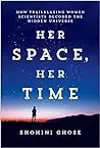
Infuriating. Also humbling and inspiring and powerfully moving. Ghose profiles twenty(ish) twentieth-century(ish) women who made astonishing groundbreaking discoveries despite relentless—and senseless—obstacles at every level. Some of the women we all know: Henrietta Leavitt, Vera Rubin, Lise Meitner. Most of the rest were unknown to me, and that's tragic because without their work and especially their insights we would be decades behind in astronomy, physics, and chemistry. (The obvious next question is too depressing to contemplate: how much farther would we be today if countless women hadn't been stifled? Weren't <i>still</i> being stifled?)
The writing is often simple, perhaps in hopes of attracting middle schoolers? (I'd be in favor of gifting this to a middle or high schooler, though I doubt they'd read it.) Reading level notwithstanding, the content shines. Ghose beautifully illustrates these women's lives and work; their challenges, their grit, and their impact. She complements many chapters with parallels from her experiences as a physicist and educator: things are better today, but not yet better enough. Her passion for learning is palpable and inspiring.
Infuriating. Also humbling and inspiring and powerfully moving. Ghose profiles twenty(ish) twentieth-century(ish) women who made astonishing groundbreaking discoveries despite relentless—and senseless—obstacles at every level. Some of the women we all know: Henrietta Leavitt, Vera Rubin, Lise Meitner. Most of the rest were unknown to me, and that's tragic because without their work and especially their insights we would be decades behind in astronomy, physics, and chemistry. (The obvious next question is too depressing to contemplate: how much farther would we be today if countless women hadn't been stifled? Weren't <i>still</i> being stifled?)
The writing is often simple, perhaps in hopes of attracting middle schoolers? (I'd be in favor of gifting this to a middle or high schooler, though I doubt they'd read it.) Reading level notwithstanding, the content shines. Ghose beautifully illustrates these women's lives and work; their challenges, their grit, and their impact. She complements many chapters with parallels from her experiences as a physicist and educator: things are better today, but not yet better enough. Her passion for learning is palpable and inspiring.

El último cuento, Las cosas que perdimos en el fuego, fenómeno. Horroroso, escalofriante, y tocando incómodamente a la realidad.
El resto me fueron difíciles leer: Enriquez trata con temas de pobreza, ignorancia, abuso, adicción, locura y más, pero (la mayoría de) sus caracteres son huecos, sin vida ni ánimo, rodeados de lo mismo. Pocos tienen inteligencia ni madurez: sus situaciones son banales, sin conección humana. Matrimonios que pelean con gritos. Niños siendo crueles. Nada interesante. Y en la mayoría, en algún momento, aparecen fantasmas o monstros u otro elemento sobrenatural, sin razón alguna y que no contribuye nada a la narrativa.
Pero ese último. Uy.
El último cuento, Las cosas que perdimos en el fuego, fenómeno. Horroroso, escalofriante, y tocando incómodamente a la realidad.
El resto me fueron difíciles leer: Enriquez trata con temas de pobreza, ignorancia, abuso, adicción, locura y más, pero (la mayoría de) sus caracteres son huecos, sin vida ni ánimo, rodeados de lo mismo. Pocos tienen inteligencia ni madurez: sus situaciones son banales, sin conección humana. Matrimonios que pelean con gritos. Niños siendo crueles. Nada interesante. Y en la mayoría, en algún momento, aparecen fantasmas o monstros u otro elemento sobrenatural, sin razón alguna y que no contribuye nada a la narrativa.
Pero ese último. Uy.
Updated a reading goal:
Read 80 books in 2025
Progress so far: 50 / 80 63%
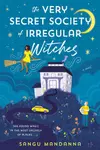
Sweet... cozy... sometimes to the point of cloying. Preachy... but entirely about values aligned with mine (kindness, community, chosen family, antiracism, resistance to bullying) so that gets a pass. Cringey levels of privilege: the love interests are all physically attractive (and we're constantly reminded of it), the main action takes place in a beautiful seaside estate without concern for anything so pedestrian as money, and all crises -- tense as they are -- get resolved rather more conveniently than is customary in (at least <i>my</i>) real life.
Still.
I liked it. Really liked it. Unashamedly. Not in a guilty-pleasure or bubblegum sort of way, either: it had depth and warmth and tension and a lot of heart.
Sweet... cozy... sometimes to the point of cloying. Preachy... but entirely about values aligned with mine (kindness, community, chosen family, antiracism, resistance to bullying) so that gets a pass. Cringey levels of privilege: the love interests are all physically attractive (and we're constantly reminded of it), the main action takes place in a beautiful seaside estate without concern for anything so pedestrian as money, and all crises -- tense as they are -- get resolved rather more conveniently than is customary in (at least <i>my</i>) real life.
Still.
I liked it. Really liked it. Unashamedly. Not in a guilty-pleasure or bubblegum sort of way, either: it had depth and warmth and tension and a lot of heart.
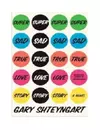
My DNF yesterday was a book that's (probably) great literature that I'm not smart enough to understand. This DNF today (at p.60) gives no indication of being great literature. One main character is a worthless self-absorbed nothing, reminiscent of Bukowski; the other main character is a deeply troubled but shallow person with glimmer of potential but not enough to keep me going. The near-future fascist dystopia is played for yuks, and I'm not in the mood for that right now.
My DNF yesterday was a book that's (probably) great literature that I'm not smart enough to understand. This DNF today (at p.60) gives no indication of being great literature. One main character is a worthless self-absorbed nothing, reminiscent of Bukowski; the other main character is a deeply troubled but shallow person with glimmer of potential but not enough to keep me going. The near-future fascist dystopia is played for yuks, and I'm not in the mood for that right now.
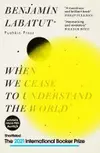
Bello tributo a la obsesión, inspiración, al genio y los bordes de la cordura. Encontré fascinante como Labatut juega con la realidad, pero no quiero hablar mucho sobre su estilo, aún en spoiler, pues él lo explica en los Reconocimientos finales. Un truco literario muy efectivo y original.
Bello tributo a la obsesión, inspiración, al genio y los bordes de la cordura. Encontré fascinante como Labatut juega con la realidad, pero no quiero hablar mucho sobre su estilo, aún en spoiler, pues él lo explica en los Reconocimientos finales. Un truco literario muy efectivo y original.
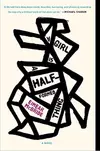
Too difficult to read, and not clear that I'd find it worthwhile. Writing is beyond choppy. Beyond staccato. Ratatat little bursts of impressions. Fragments. Hard to read. Not a comma to be found. Best read quickly maybe. Form a gestalt? Couldn't.
And the gestalt I formed is of a child cowering and trying to survive in an environment of ignorant abusive religious subhumans. Don't need that right now.
Too difficult to read, and not clear that I'd find it worthwhile. Writing is beyond choppy. Beyond staccato. Ratatat little bursts of impressions. Fragments. Hard to read. Not a comma to be found. Best read quickly maybe. Form a gestalt? Couldn't.
And the gestalt I formed is of a child cowering and trying to survive in an environment of ignorant abusive religious subhumans. Don't need that right now.

